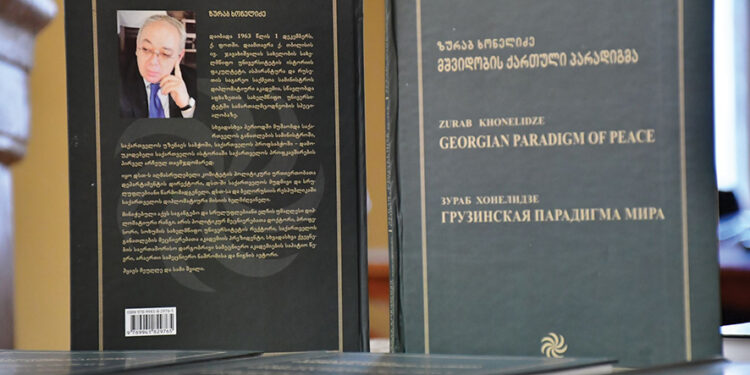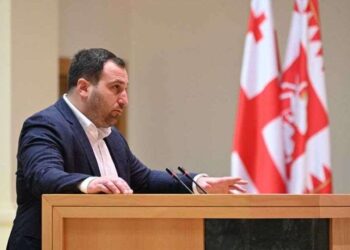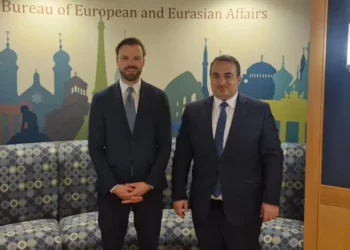Few people – whether in Georgia (Sakartvelo) or abroad – are aware of a remarkable book already translated into twelve languages: The Georgian Paradigm of Peace by Professor Zurab Khonelidze, president of the Georgian Academy of Education. This work deserves close attention not only from Georgian society but also from the wider international community, as it touches on one of the most urgent questions of our time: how to pursue peace in a world where conflict dominates the headlines.
Khonelidze argues that the modern global order is inconsistent, multipolar, and driven by consumption, yet dangerously lacking any durable foundation for peace. Georgia, as part of this system, is caught in the middle: politically divided, ideologically unsettled, and economically struggling. Burdened by problems inherited from earlier governments, the nation faces the critical challenge of maintaining peace at home.
Ironically, however, the government’s peace-oriented policies are frequently attacked – criticized both by domestic opposition groups and by segments of the Western liberal community, as though the pursuit of stability were somehow suspect.
To move beyond this deadlock, Khonelidze insists, requires a transformation in the way people think – both within Georgia and beyond. The restoration of territorial integrity and the resolution of ethnic-political disputes cannot succeed without the involvement of global powers and international institutions. Peace in Georgia depends not only on internal reforms but also on understanding the balance of interests that sustains the world order.
The recent peace agreement between Armenia and Azerbaijan, signed in Washington under US mediation, illustrates this point. Georgia was not officially present, but its absence was only procedural. Its geopolitical significance ensures that it remains central to any vision of regional stability. As Khonelidze observes, American interest in the South Caucasus extends far beyond bilateral negotiations: the United States sees the entire region, and especially Georgia, as strategically vital.
The South Caucasus itself holds a special place in Professor Khonelidze’s framework. While the North Caucasus is part of the Russian Federation, the South Caucasus consists of three independent states – Georgia, Armenia, and Azerbaijan. This region, shaped by a synthesis of Caucasian, Eastern, and Western influences, has long served as a bridge between civilizations. Within it, Georgia plays a unique role: it is both a historical link and a natural balancing force between East and West.
Yet the dream of Caucasian unity has never been realized. For Georgia, legitimate positioning in the international system requires embracing its regional role while fostering balance in domestic politics. This, Khonelidze stresses, means countering polarization and exposing false narratives with clear, fact-based analysis. The battle for peace is not only geopolitical, but also intellectual and cultural.
At the heart of this vision lies the consolidation of Georgian society. Here, youth have a particularly important role. Energetic, motivated, and less burdened by the divisions of the past, young Georgians represent the healthiest part of society. Their participation in building a unified and peaceful nation is essential. This project is animated by the loftiest national value: Georgia’s perpetual quest for freedom.
Khonelidze’s message is clear: without Sakartvelo, peace and cooperation in the South Caucasus are nearly impossible to achieve. Georgia is indispensable not only for its own future but also for the stability of the entire region. The country’s historical position, cultural identity, and strategic geography make it a cornerstone for any sustainable peace in the Caucasus.
For over three decades, Professor Khonelidze has advanced this idea with conviction and consistency. His book, The Georgian Paradigm of Peace, is more than a scholarly text. It is a call to action, a reminder that peace is not a passive condition but an active choice that requires courage, imagination, and persistence. At a moment when global politics is overwhelmed by conflict and distrust, his message is both urgent and timeless: humanity must choose peace over war, reason over radicalization, and cooperation over division.
Zurab Khonelidze’s vision may be ambitious, but it is rooted in a truth often overlooked: peace is not simply the absence of conflict; it is the deliberate construction of unity, stability, and freedom. For Georgia – and for the world – this paradigm offers not just hope, but a roadmap for the future.
Blog by Nugzar B. Ruhadze














